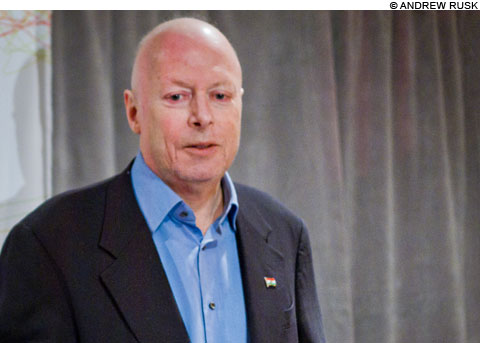
A DISSIDENT WAS HERE The greatest lesson Christopher Hitchens taught was not to follow every slice of wisdom he — or anyone — offered. |
Most of the classes I had with Christopher Hitchens began the same way. He'd show up at the New School Graduate Faculty about 10 minutes late, reeking of butt smoke. Then he'd toss his fall coat on a chair and interrupt his trusty "Cultural Reporting and Criticism" co-professor, Melissa Monroe, before catching everybody up on his travels to the Middle East. But one day in particular stands out in my memory, since Hitch spent a great deal of time battering an essay I wrote about college friends who took jobs in finance, and who were quickly morphing into corporate monsters.Hitch asked why I didn't name my buddies or my alma mater — he was upset that I let them off the hook so easily. If I wanted to sling polemics for a career, he said, I'd have to "write like everyone I know is dead" — in other words, I shouldn't worry that my grandmother, associates, or anyone else might cry about something that I publish. As was the post-class routine, our conversation spilled over to the Cedar Tavern on University Place, where the braver drunks from my section often discussed war and writing with Hitchens over scotch and cigarettes, sometimes for up to four or five hours.
I'd come to the New School specifically to study under Hitchens. His Letters to a Young Contrarian awakened me, as did his viscous takedown of Mother Teresa in The Missionary Position. In the former, he wrote that "the noble title of 'dissident' must be earned rather than claimed; it connotes sacrifice and risk rather than mere disagreement, and it has been consecrated by many exemplary men and women." Hitchens had clearly earned it, and I wished to do the same. His advice — to write without inhibition — would push me closer to that goal, particularly when I got to see his principle in practice.
It was 2002, and the United States was ramping up its efforts in the Middle East. The Graduate Faculty, bastion of liberalism that it is, was reeling. Every class discussion spun into a circle-jerk meditation on preemptive warfare, while students and faculty members carried signs on Fifth Avenue condemning violence. Hitchens refused to get in line, arguing that liberals would be unwilling to engage an enemy whether they had weapons of mass destruction or not.
When Hitchens told my class that he was leaving The Nation due to their dismissal of his increasingly pro-war views, nobody believed him. That was until the magazine printed his last column the following week, and his departure became national news. In the process, Hitchens fought with, and lost, countless friends, colleagues, and students, not to mention fans whose bleeding hearts he'd crushed without a care. One night at the Cedar, he got so hawkishly nasty that everyone other than my friend Mark and I bounced after just a few rounds.
Observing Hitchens up close in that struggle, I learned the importance of avoiding narrow political and ideological boundaries, and of eschewing generic labels like "leftist," "socialist," and all of their hyphenated variations — no matter how loudly critics holler. I didn't follow every slice of wisdom that Hitchens offered. (He once suggested that to be taken seriously, I'd have to stop listening to rap music, dressing like a "criminal," and using hip-hop flare in my prose. Not happening.) Instead, I left the New School after that semester, and started my career. I still try to write like everyone I know is dead. Including Christopher Hitchens.